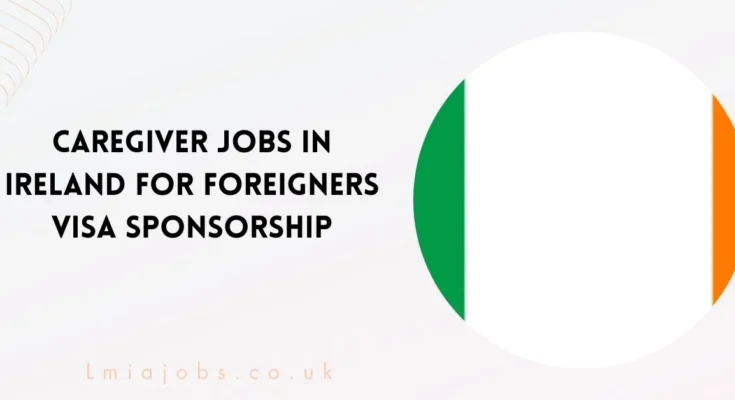Ireland has announced a new opportunity for foreign workers seeking caregiver positions in the country. In an effort to address growing demand in healthcare and caregiving, Ireland is offering visa sponsorship for up to 40,000 foreign workers. These visas are sponsored for free by Irish employers, making it an attractive option for carers from non-EU/EEA countries who are interested in working in Ireland.
Read Also: Dairy Farm Jobs in Ireland Visa Sponsorship for Foreigners
Caregiver Job Details in Ireland: Visa Sponsorship:
- Job Title: Caregiver
- Location: Ireland (Multiple regions available)
- Type of Employment: Full-Time
- Visa Sponsorship: Yes, available for non-EU/EEA nationals
- Salary: €16–€18 per hour, with annual salaries ranging from €25,000 to €35,000
- Age Requirement: 19 years and above
- Minimum Education: High school diploma or equivalent
- Languages Required: English (mandatory)
- Experience Required: 1+ year of caregiving experience preferred
- Gender: Open to all
Job Duties and Responsibilities of Caregivers in Ireland:
Caregiving is a rewarding role, and carers in Ireland are essential to the healthcare system, especially as the population ages. As a caregiver, your duties will primarily revolve around providing physical, emotional, and medical support to those in need.
Key Responsibilities:
- Personal Care: Assisting clients with daily activities like bathing, dressing, and grooming to ensure they maintain their hygiene and comfort.
- Medication Management: Administering medication, ensuring clients follow their prescribed medical regimens, and maintaining medication schedules.
- Meal Preparation: Planning and preparing balanced, healthy meals that meet clients’ dietary needs, whether they are based on health conditions or preferences.
- Housekeeping: Providing light housekeeping services, including cleaning, laundry, and keeping the client’s living environment safe and tidy.
- Companionship: Offering emotional support and providing companionship to clients to combat loneliness, which is particularly important for elderly clients.
- Mobility Assistance: Helping clients with mobility issues by assisting them in walking, transferring in and out of bed, or using assistive devices like wheelchairs and walkers.
- Health Monitoring: Keeping an eye on the client’s health, reporting any changes to healthcare professionals, and providing general wellness checks.
- Running Errands: Helping with grocery shopping, picking up prescriptions, and managing other daily tasks that the client cannot do on their own.
Benefits of Working as a Caregiver in Ireland:
Ireland offers attractive benefits for carers, making this opportunity even more appealing. The role not only offers competitive pay but also comes with a range of other professional and personal advantages.
Key Benefits Include:
- Competitive Pay: Carers can earn between €16 and €18 per hour. The salary may increase with experience, special skills, or qualifications, and there is also potential for overtime pay.
- Job Satisfaction: Working in caregiving is incredibly rewarding. You’ll make a real difference in people’s lives and help improve the quality of life for those in need of assistance.
- Health and Pension Benefits: Long-term employees are often eligible for healthcare insurance and pension schemes. Employers often provide coverage, which can be a significant financial benefit.
- Paid Time Off: Carers typically receive paid holidays and vacation leave, allowing them time to relax and recharge.
- Flexible Work Hours: Many caregiving positions offer flexible working hours, allowing carers to balance their work and personal lives effectively.
- Job Security: As Ireland’s ageing population grows, the demand for carers is increasing. This translates into job stability and security for those working in the caregiving field.
- Training and Career Advancement: Many employers provide training and opportunities for career progression. You can pursue further qualifications or specialize in particular aspects of caregiving, such as dementia care or palliative care.
Requirements for Caregiver Jobs in Ireland:
To apply for caregiver jobs in Ireland, candidates need to meet a few basic eligibility requirements and qualifications.
General Qualifications and Experience:
- Education: A high school diploma is required. Additional qualifications such as a QQI Level 5 in healthcare support or an FETAC certification are highly recommended, especially for those looking to advance their careers.
- Experience: At least one year of caregiving experience is typically preferred, especially with elderly or disabled individuals. However, some employers may accept entry-level candidates willing to undergo training.
- Skills: Carers must be able to communicate effectively with clients, their families, and other healthcare professionals. Patience, empathy, and strong interpersonal skills are essential for success in this role.
- Physical Fitness: Caregiving often requires assisting clients with mobility, lifting, and walking. Being in good physical condition is important for performing these tasks safely.
- Background Check: You’ll need a clean background check, also known as Garda screening, to ensure you are trustworthy and suitable to work with vulnerable individuals.
- First Aid Training: Certification in first aid or CPR is frequently required, and some employers may offer training programmes to provide these certifications.
- Driving License: In certain cases, carers may need a valid driver’s license, especially if the job involves travelling between clients’ homes.
Visa and Work Permit Information for Non-EU/EEA Nationals:
If you are a non-EU/EEA national, you will need a visa to work in Ireland. Here’s an overview of the process and requirements:
Visa Types:
- Employment Permit: Carers are eligible for a General Employment Permit in most cases. In some cases, if the caregiving position is considered a skill shortage, you may be eligible for the Critical Skills Employment Permit.
- Long-Stay Visa (D Visa): This visa is necessary for stays longer than 90 days and is tied to your employment permit.
- Residence Permit: If you’re staying in Ireland for more than 90 days, you will need a residence permit, which is often provided with your employment permit.
Key Visa Requirements:
To apply for a caregiver position in Ireland with visa sponsorship, ensure that you meet these criteria:
- Valid Job Offer: A confirmed employment offer from an Irish employer who is willing to sponsor your visa.
- Qualifications: Relevant caregiving or healthcare qualifications (e.g., QQI Level 5 in Healthcare Support).
- Language Proficiency: You must demonstrate proficiency in English, as it is the primary language of communication in caregiving roles. This can be shown through IELTS, TOEFL, or other recognised English language tests.
- Health Insurance: Proof of health insurance coverage, which is typically arranged by the employer.
- Police Clearance: A background check to ensure you have no criminal history.
- Proof of Identity: A valid passport with at least six months of validity remaining.
- Proof of Accommodation: You’ll need to show where you will be living during your stay in Ireland, which may be provided by your employer.
How to Apply for Caregiver Jobs in Ireland?
Here’s how you can apply for a caregiver position with visa sponsorship:
- Research Employers: Begin by researching Irish companies that hire foreign carers. Many agencies specialize in recruiting international carers.
- Check Eligibility: Ensure that you meet the qualifications and experience requirements. Employers may have specific requirements depending on the role.
- Prepare Your Documents: Gather necessary documentation, including proof of identity (passport), education and experience certificates, a background check, first aid certifications, and English language proficiency results.
- Submit Your Application: Apply to caregiving jobs via online job boards, agencies, or directly through employer websites. Include a tailored resume and cover letter highlighting your relevant experience and qualifications.
- Secure a Job Offer: Once you receive a job offer, the employer will guide you through the visa sponsorship process.
Conclusion:
Ireland offers a fantastic opportunity for foreign carers to live and work in a thriving healthcare environment while benefiting from visa sponsorship, competitive pay, and other benefits. The growing demand for skilled carers ensures job security and career growth for those who meet the qualifications.
Frequently Asked Questions
-
What is the salary range for caregivers in Ireland?
Carers can earn between €16 and €18 per hour, with annual salaries ranging from €25,000 to €35,000, depending on experience and location.
-
What are the eligibility requirements for caregiver jobs in Ireland?
Candidates must be at least 19 years old, have a high school diploma, have a minimum of one year of experience (preferred), and proficiency in English (mandatory).



